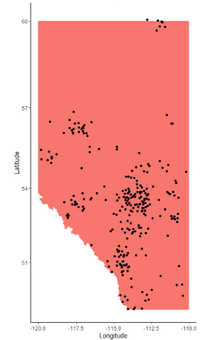 The data rescue intern: Jacob Hubner Background Community science has been slowly gaining traction as a method for conducting studies across massive scales. Large community sources of data such as eBird are being used in studies to analyze metrics such as species trends and community compositions. The lack of oversight in community science and the possible sources of error that stems from less-than-rigorous data collection is argued to be offset by the massive sample sizes. Owl surveys have been run by volunteers across the country over the last few decades. Bird studies Canada has worked with biologists who have held on to over 1500 surveys of nocturnal owl data from 1998 to 2020 and are in the process of collecting and digitizing them for analysis. These surveys have been kept by biologist Lisa Takats Priestley and now require digitization and cleaning in order to join the larger national dataset. This is what I set to assist with for my Living Data Internship. What I learned
The most important aspect of coding is not memorizing the syntax. It is understanding how to break down a problem into something code can actually solve. This was the most important skill I got to develop during my internship. Most of the work I completed involved checking data for inconsistencies (and fixing them if possible) and creating/modifying/columns to fit the data into another piece of code later on. It sounds straightforward, but you would be surprised how many little things can go wrong and how unique each issue is. Sometimes I didn’t even know where to start! The key was figuring out the small steps, writing some pseudocode, and translating that into something that works. The more I did it, the easier it became. Often, many of the smaller steps would be the same for different larger problems, making it easier to code once I knew what needed to be done. I also got a good taste of how important it is to be clear on goals, timelines, and duties when working with multiple parties in large projects like this. Everyone is dependent on each other to make the final product. Keeping lines of communication open and getting the most out of meetings is extremely valuable. Impact This data is a part of a nationwide analysis on owl population changes over recent decades. The massive amount of data could give us insights to declining owl species or changing communities. The environmental data collected during these surveys may help correlate species changes to long-term trends in climate. To receive a complete picture of the owls in Canada, it’s important to include as much of it as possible. Alberta is a large swath of land connecting Canada to the west coast and thus having an Alberta-sized whole in the data record creates a much larger disturbance due to its central location. The results of this study may help reduce the speed of failing populations. First, by identifying them. Second, by using the location and environmental data of more stable populations to suggest solutions for habitat improvement. Comments are closed.
|
Archives
October 2023
Categories |

 RSS Feed
RSS Feed